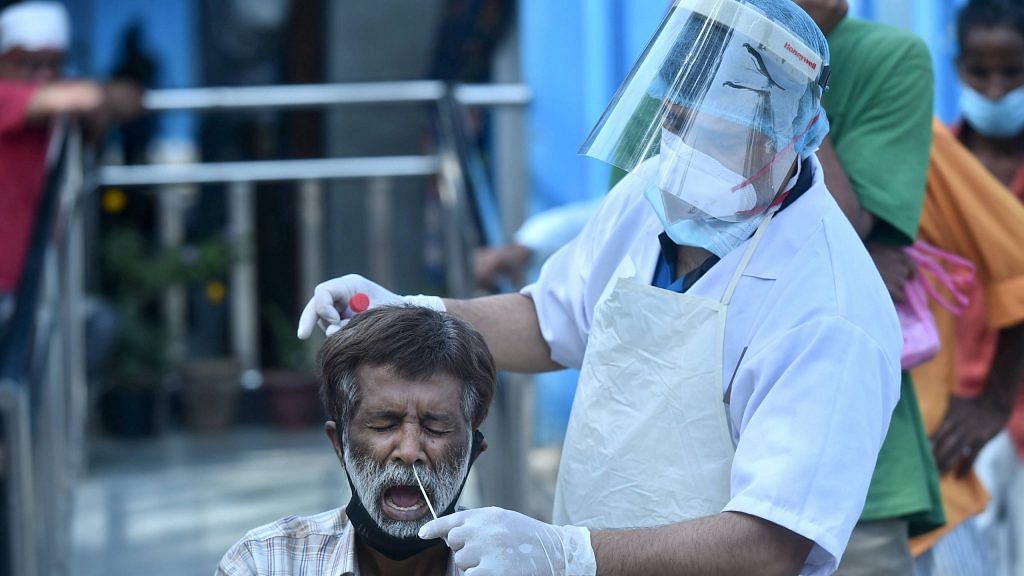New Delhi: At least one-third of Covid-19 patients received a neurological or psychiatric diagnosis within six months of infection, a study of over 2,30,000 patients has said. Thirteen per cent of these had never received a neurological or psychiatric diagnosis before, it added.
The study, published in The Lancet Psychiatry journal Wednesday and led by Oxford University researchers, claims that the SARS-CoV-2 virus causes serious disorders that affect the nervous system, which leaves patients in poor health months after they have recovered from Covid-19.
Since the beginning of the pandemic, there have been reports that those diagnosed with Covid-19 are at increased risk of neurological disorders.
Researchers have also reported that Covid-19 patients are likely to develop mood and anxiety disorders in the first three months after infection.
However, the Lancet study is the first to analyse the health records of 2,36,379 patients from the US-based TriNetX network — a global health research network — for a period of six months.
The study included patients older than 10 years who were infected with the virus after 20 January 2020 and were still alive on 13 December 2020.
The data was compared with that of 1,05,579 patients diagnosed with influenza and 2,36,038 patients diagnosed with other respiratory tract infections.
Also read: Pandemic spreading faster than before, next 4 weeks ‘very critical’, Modi govt says
Study conclusions
According to the study, 34 per cent of the Covid-19 patients examined had been diagnosed with a neurological or mental health disorder in the six months after infection. For 13 per cent of these, it was their first recorded neurological or psychiatric diagnosis.
Of the patients studied, 17 per cent were diagnosed with anxiety disorders, 14 per cent with mood disorders, 7 per cent with substance misuse disorders, and 5 per cent with insomnia.
The incidence of neurological outcomes was found to be lower — 0.6 per cent for brain haemorrhage, 2.1 per cent for ischaemic stroke or brain stroke, and 0.7 per cent for dementia.
“These are real-world data from a large number of patients. They confirm the high rates of psychiatric diagnoses after Covid-19, and show that serious disorders affecting the nervous system (such as stroke and dementia) occur too,” Paul Harrison, lead author of the study, from the University of Oxford, said in a statement
“Although the individual risks for most disorders are small, the effect across the whole population may be substantial for health and social care systems due to the scale of the pandemic and that many of these conditions are chronic,” added Harrison.
Also read: Covid mutants multiply as scientists race to decode variations
‘Severe Covid increases neurological risk’
The study also identified distinctions within the severity of the infection.
For instance, it was found that those who had severe Covid-19 were at a higher risk of a neurological or psychiatric diagnosis — 38 per cent — as opposed to 34 per cent overall.
The risk further increased to 46 per cent for those who were admitted in intensive care, and 62 per cent for those who suffered delirium during the infection.
The team also looked at people who experienced flu and other respiratory tract infections over the same time frame to help understand whether these neurological and mental health complications were linked specifically to Covid.
They found that there was a 44 per cent greater risk of neurological and mental health diagnoses after Covid-19 than after the flu.
“Our results indicate that brain diseases and psychiatric disorders are more common after Covid-19 than after flu or other respiratory infections, even when patients are matched for other risk factors,” Max Taquet, a co-author of the study, from the University of Oxford, said.
“We now need to see what happens beyond six months. The study cannot reveal the mechanisms involved, but does point to the need for urgent research to identify these, with a view to preventing or treating them,” Taquet added.
(Edited by Rachel John)
Also read: The Peltzman Effect and the lessons this theory on road accidents has for Covid behaviour
